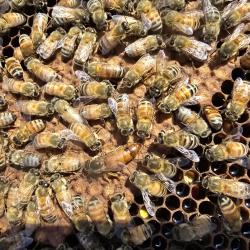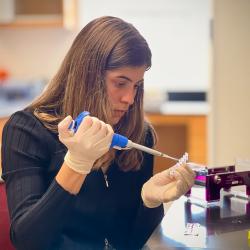UMD Computer Science Major Creates AI Tutor to Simplify Classwork
Thai Cao’s Mindgrasp startup turns dense lectures into digestible notes for busy college students.
Several years ago, a thought occurred to University of Maryland computer science major Thai Cao: What if artificial intelligence (AI) could help students learn faster and more efficiently?
Though AI was still a relatively untapped market at that time, Cao sensed that it could revolutionize the college experience—and out of this idea, Mindgrasp was born. Founded and led by Cao, the startup aims to make studying easier for students of all backgrounds, strengths and learning styles. Mindgrasp subscribers upload lecture videos, textbook chapters and presentation slides, and the AI model spits out study guides that break down complex concepts.
Since launching in December 2022, Mindgrasp amassed more than 10,000 users around the world and more than 34,000 followers on social media. It is now available in multiple languages and accessible to students of varying learning abilities.
Cao runs Mindgrasp with help from a close-knit team that includes several UMD students and alums, including information science major Rosie Burns, economics major Daivat Patel and Shayan Khanlarbeik (B.S. ’22, biological sciences). Their success is the culmination of Cao’s personal mission to help people through technology.
“I’ve always had a drive for entrepreneurship,” Cao said. “I wanted to build something that would make a large impact, and I knew I couldn’t do it alone. I achieved that through meeting great people and building a great team.”
Hatching a plan
Long before Cao was a startup CEO, he was a student with an idea. In 2019, Cao gathered two of his friends and participated in UMD’s JHacks hackathon with vague ambitions of building an AI-based product.
“What’s really fun about hackathons is that they force you into the mindset of being a problem-solver when you don’t even know the problem,” Cao said. “We wanted to leverage AI, but we didn’t know exactly how. We just knew the opportunity could not be missed.”
Their initial idea was to create a simple question and answer tool, but they decided to add more features after consulting computer science faculty members and joining several campus organizations for student entrepreneurs, including the Terp Startup Accelerator, Startup Shell and Mokhtarzada Hatchery.
As members of the Mokhtarzada Hatchery’s inaugural 2021-22 cohort, the Mindgrasp team received personalized advice from Haroon (B.A. ’01, economics), Idris (B.S. ’10, computer science) and Zeki (B.S. ’01, computer science and mathematics) Mokhtarzada—three brothers with successful careers as entrepreneurs who founded the Hatchery.
“The Mokhtarzada brothers provided a lot of value on how we iterate a product to make it sellable,” Cao said. “That was actually one of the biggest turning points for our business model and our platform.”
The brothers urged the team to collect data on what their customers wanted, which inspired them to conduct surveys.
“We wanted this product to be built by students and for students,” Cao said. “We surveyed a bunch of potential users and learned that what students wanted was essentially to save time.”
They ultimately decided to focus on features that would save students from having to take painstaking notes or create detailed study guides.
From developer to leader
While AI’s place in the classroom is hotly contested, Cao is quick to point out that Mindgrasp is not for students who want an easy way out of classwork.
“Our platform isn’t designed for cheating,” Cao said. “We wanted to make material that’s supplemental, so students can still read the original material, but additionally they have so many more tools to absorb as much information as they can.”
In addition to navigating the tricky ethics of AI, the Mindgrasp team focuses on accommodating a wide range of learning styles. Their platform offers bionic reading, which highlights specific parts of words to enable faster comprehension. Mindgrasp can also generate case studies for students who learn by example and can convert text to speech for those who like to listen while reading along.
As a student with attention-deficit/hyperactivity disorder (ADHD), Cao personally finds the text-to-speech function helpful.
“For a person with ADHD like me, I have to read and listen at the same time to comprehend and retain the information better,” he said. “We’re continuously trying to add more support for other accessibility needs, too.”
Since the product’s launch, the team learned through case studies that Mindgrasp helps users feel more confident in the classroom because they find the subject matter less intimidating.
“We’ve found that students are actually enjoying the topic more because they feel more readily equipped,” Cao said. “They're able to see this information and it doesn't look like a massive, scary piece of text.”
Raj Khera (B.S. ’86, M.S. ’88, electrical engineering), a member of the UMD College of Computer, Mathematical, and Natural Sciences’ Board of Visitors, became a Mindgrasp advisor last year after seeing the team’s presentation at a board meeting. He said he remains impressed with the team’s vision and rapid growth.
“I can see Thai and his partners growing into their roles as part of a team that is building a game-changing product to help students learn faster,” he said. “Through some smart strategic marketing, the product has experienced rapid growth throughout the U.S. and other countries since launching in the late fall of 2022, and we expect continued growth as we expand Mindgrasp's footprint."
The Mindgrasp team’s goal is to reach 5 million users by 2025. They regularly receive feedback from student users—and given the rapid growth of AI chatbots, Cao believes that direct connection will help Mindgrasp stay competitive.
“A lot of these AI platforms are using a shotgun approach. They’re simply spreading themselves too thin,” Cao said. “We’re very focused on a specific problem, which is helping college students and helping people in higher education. Our vision is to make learning easy and also fun.”







